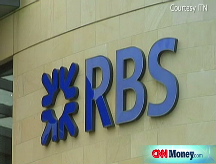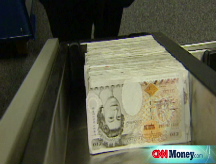Dollar hits 23-year high against pound
Greenback surges as UK announces official recession, dollar hits 6-week high against euro, falls to 13-year low versus yen.
 |
| Click chart to view latest currency exchange rates |
NEW YORK (CNNMoney.com) -- More dour economic news out of the United Kingdom pushed the pound to a 23-year low against the dollar Friday.
British gross domestic product declined by 1.5% in the fourth quarter of 2008, the U.K. government announced Friday. That followed a 0.5% drop in the third quarter, marking two consecutive quarters of declines and officially placing the British economy in a recession.
The pound fell to $1.3783, down 0.66% from late Thursday's $1.3877.
The pound fell to an intraday low of $1.35 Friday, its weakest since September 1985. Although sterling has since rebounded, there's little to keep it from falling to new lows, said John Kicklighter, a currency strategist with DailyFX in New York.
He thinks the pound has dropped too rapidly, moving from $2.10 to the current low in just eight months.
"It has fallen far too quickly. When you have such dramatic changes, there's a point when people have to step back and ask if it's justified to fall so far," Kicklighter said.
He thinks that traders and investors will start to pay more attention to the fundamentals of the U.K. economy in their estimation of the pound. Sterling's recovery will be tied to how quickly the U.K. can recover from recession, Kicklighter said.
The pound could get a boost if U.S. GDP for the fourth quarter falls by more than the expected 5%, he said.
But the pound could weaken in upcoming weeks if ratings companies downgrade U.K. debt as a result of its government's plan to guarantee bank assets backed by mortgages and other loans.
Earlier this week, the Royal Bank of Scotland (RBS) reported an astounding loss.
The euro is back to its Dec. 8 lows against the dollar, after a euro-zone purchasing managers index showed the region's manufacturing industry continued to contract.
The January PMI reading came in at 38.5 compared to 38.2 in December, which was an all-time low for the survey that began tracking data in 1998. A reading below 50 indicates sector contraction.
The euro dropped to $1.2982, down 0.15% from $1.3002 late Thursday.
The dollar has generally been in an upward trend against European currencies for the past several months, especially as the economic situation in Europe has deteriorated.
Traders have also been cautious about investing in the euro, after Spain's credit rating got a downgrade and the European Commission said the euro-zone economy could shrink 1.9% this year.
Furthermore, for many, the dollar still holds the "world's currency" title, and risk-averse traders plow into the dollar in times of trouble.
The U.S. currency has also fallen against the yen when it has traded higher against the euro - and the dollar has risen against the yen when it is down against the euro. Traders tend to borrow the yen to fund investments in higher-yielding currencies, but when those currencies weaken, and investors reverse their positions, they are forced to buy back the yen, raising its value.
The dollar fell to a 13-year low against the Japanese currency, to ¥88.82 from late Thursday's ¥88.91. The last time the dollar was this low was August 1995.
CNNMoney.com staff writer David Goldman contributed to this report. ![]()




